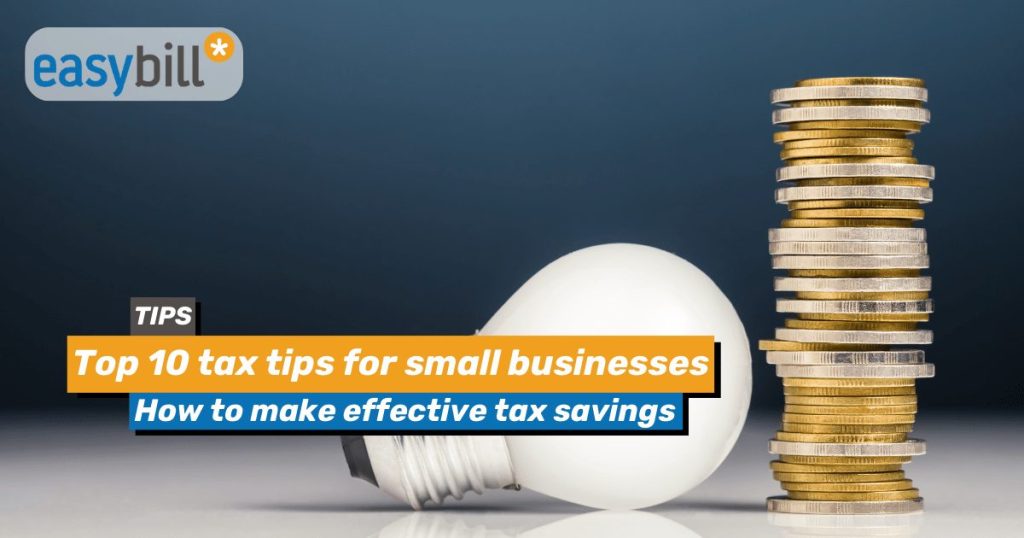
For small business owners, it is crucial to keep the tax burden as low as possible in order to maximize profits and keep the business healthy. Especially when self-employed, the tax system can often be complex and confusing. However, with the right tips and careful planning, taxes can be saved effectively. In this article, we give you our top 10 practical tax tips to help you make the most of your tax return and avoid unnecessary expenses.
1. Use the small business regulation correctly
As a small business owner, you can benefit from the small business regulation if your turnover did not exceed EUR 22,000 in the previous year and EUR 50,000 in the current year. This regulation exempts you from VAT liability, which simplifies your bookkeeping and makes your prices more attractive to end customers.
However, check carefully whether it is advantageous in the long term to waive the VAT liability. If necessary, consult your tax advisor to be on the safe side.
2. Deduct business expenses in full
You can deduct all expenses that are directly related to your business operations as business expenses. This includes office supplies, specialist literature, travel expenses and even your home office if certain conditions are met. Make sure you carefully collect and document all receipts and vouchers.
Ideally, you should use software such as easybill, in which you can record and manage all your outgoing invoices and incoming documents. This way, you won’t lose track and have everything in one central location. Of course, you still need to keep the original receipts.
3. Use the investment deduction
The investment deduction (IAB) allows you to claim up to 50% of the expected acquisition costs for planned investments for tax purposes before the actual acquisition. This can significantly reduce your tax burden in the year in which you claim the IAB.
Get started as a small business owner with easybill
The solution for automated invoicing processes. Test now for 7 days free of charge!
4. Tax optimization for small businesses by building up reserves
You can reduce your tax burden by setting aside reserves for investments or other business purposes. Check whether and to what extent you can build up reserves and be sure to plan this into your financial strategy.
5. Tax private withdrawals correctly
If you withdraw money or other benefits from your company for private purposes, these must be taxed correctly as private withdrawals. Make sure that these withdrawals are properly documented to avoid subsequent payments or penalties.
6. Use tax-free benefits and bonuses
You can grant tax-free benefits to employees or yourself as managing director, for example in the form of benefits in kind of up to EUR 50 per month or certain allowances for travel tickets. These benefits increase employee satisfaction and are tax-privileged.
7. Optimal planning of depreciation
Depreciation reduces your taxable profit by spreading acquisition costs over the useful life. Make sure you choose the most favorable depreciation method for you, be it straight-line or declining-balance depreciation. Also take into account the possibility of special depreciation.
8. Correct travel expense report
If you travel on business, you can claim the costs incurred for tax purposes. This includes travel costs, overnight stays and additional meal expenses. Keep a detailed logbook and collect all receipts to be able to claim the costs correctly.
9. Don’t forget your advance sales tax return
If you no longer fall under the small business regulation, you must submit regular advance VAT returns. Make sure you do this on time to avoid late payment interest or penalties. The best way to do this is to use tax software that makes your work easier.
10. Take advantage of professional tax advice
It can be particularly useful for small businesses to consult a tax advisor. This not only helps with a correct tax return for small businesses, but also with strategic tax planning.
You can deduct the costs for the tax consultant as business expenses, which in turn reduces your tax burden.
Tax optimization for small businesses – seizing opportunities
Saving taxes is not rocket science for small business owners if you take the right measures. With a well thought-out strategy, making the most of tax breaks and the right documentation, you can significantly reduce your tax burden and focus on growing your business. Use the tips above to get more out of your income and run your business successfully.
Read also:
6 common mistakes when creating e-invoices
The best e-commerce marketplace for your business? easybill compares the most popular platforms
Successful offers for freelancers: tips and tricks for more orders

